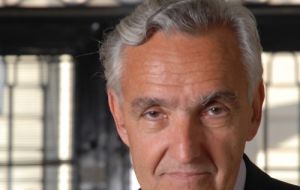MercoPress. South Atlantic News Agency
Argentina formally multiparty, but with an only hegemonic political force
 Rosendo Fraga argues Argentina no longer seems bi-partisan
Rosendo Fraga argues Argentina no longer seems bi-partisan Leaving names aside, Sunday’s election consolidates in Argentina the hegemonic Peronist movement as the prevailing political force to the extent that it not only amply occupies officialdom but also part of the opposition, argues Rosendo Fraga a renowned Argentine political analyst and historian.
Peronism (CFK version) has achieved a resounding success in the first round with no need of a run off, restored control over Congress and has 21 out of 24 federal districts loyal. Only Buenos Aires City, Santa Fe and San Luis are outside the fold, points out Fraga.
“The election therefore leaves as a central political question the role to be played by Peronism in the future of Argentina”, since the last three general elections only confirm that hegemonic dominance tendency.
Fraga recalls that in when the 2003 election the three main Peronist candidates (Carlos Menem, Nestor Kirchner and Adolfo Rodriguez Saá) totalled 63% of the overall vote while the only hopeful for the Radical Party, always considered the main opposition, only garnered 2.6% with Leopoldo Moureau.
In 2007 the three Peronist candidates (Cristina Kirchner, Roberto Lavagna and Alberto Rodríguez Saá) completed 72% of the vote and the Radicales did not even present a candidate.
Last 14 August when the mandatory simultaneous political parties’ primaries the three Peronist presidential hopefuls (CFK, Eduardo Duhalde and Adolfo Rodríguez Saá) again reached 71% of the vote, a percentage likewise repeated on Sunday.
“Argentina thus seems to be no longer bi-partisan and Peronism has erected and confirmed as a political force that occupies both the space of officialdom and part from the opposition, reunifying or splitting up once in office according to the circumstances”, underlines Fraga.
As an interesting point referred to the opposition for the first time in Argentine history a Socialist candidate was the second most voted presidential candidate.
With control over Congress and 36 points ahead of her runner up CFK should face no problem after next 10 December in having the 2012 budget approved and in further extending the economic emergency bill, both of which give the Executive the upper hand over congressional control in spending issues.
The lands bill currently delayed by the opposition will have no problem in passing the new Legislative nor will the reform of the Central bank charter making it less independent and more accessible to budgetary needs.
However amending the constitution won’t be that easy because 48 Senators and 167 Lower house members are needed, but Argentine experience indicates that the threat of appealing to direct democracy through a non linking referendum can convince the opposition to accompany such initiatives.
This happened in 1993 when Carlos Menem managed to have a new charter approved with support from the opposition.




Top Comments
Disclaimer & comment rules-

-

-

Read all commentsSo the government parties and the opposition parties are one and the same !
Oct 25th, 2011 - 12:30 pm 0No wonder the government got re-elected then.
With nobody to hold the Government to account, all we can say say is “Long Live The Status Quo!”
1 GeoffWard2
Oct 25th, 2011 - 02:59 pm 0No wonder the government got re-elected then, indeed.
”Under the Kirchner administrations, Argentina has achieved the fastest growth in the west – after defaulting. Listening, Europe?
http://www.guardian.co.uk/commentisfree/cifamerica/2011/oct/23/cristina-kirchner-argentina
Before embarking on an “ego trip”, she (CFK) should look back in history and carefully look at what happened to: Hitler, Musolini, more recently..Mubarak, Gadhafi, Hussein...
Oct 25th, 2011 - 04:12 pm 0Dictatorship never worked, does not work and will never work. CFK is hiding behind the “democracry” screen. She looks more than a dictator in the making than anything else. Hint: ...ammending the constitution to seek a third term???
Commenting for this story is now closed.
If you have a Facebook account, become a fan and comment on our Facebook Page!